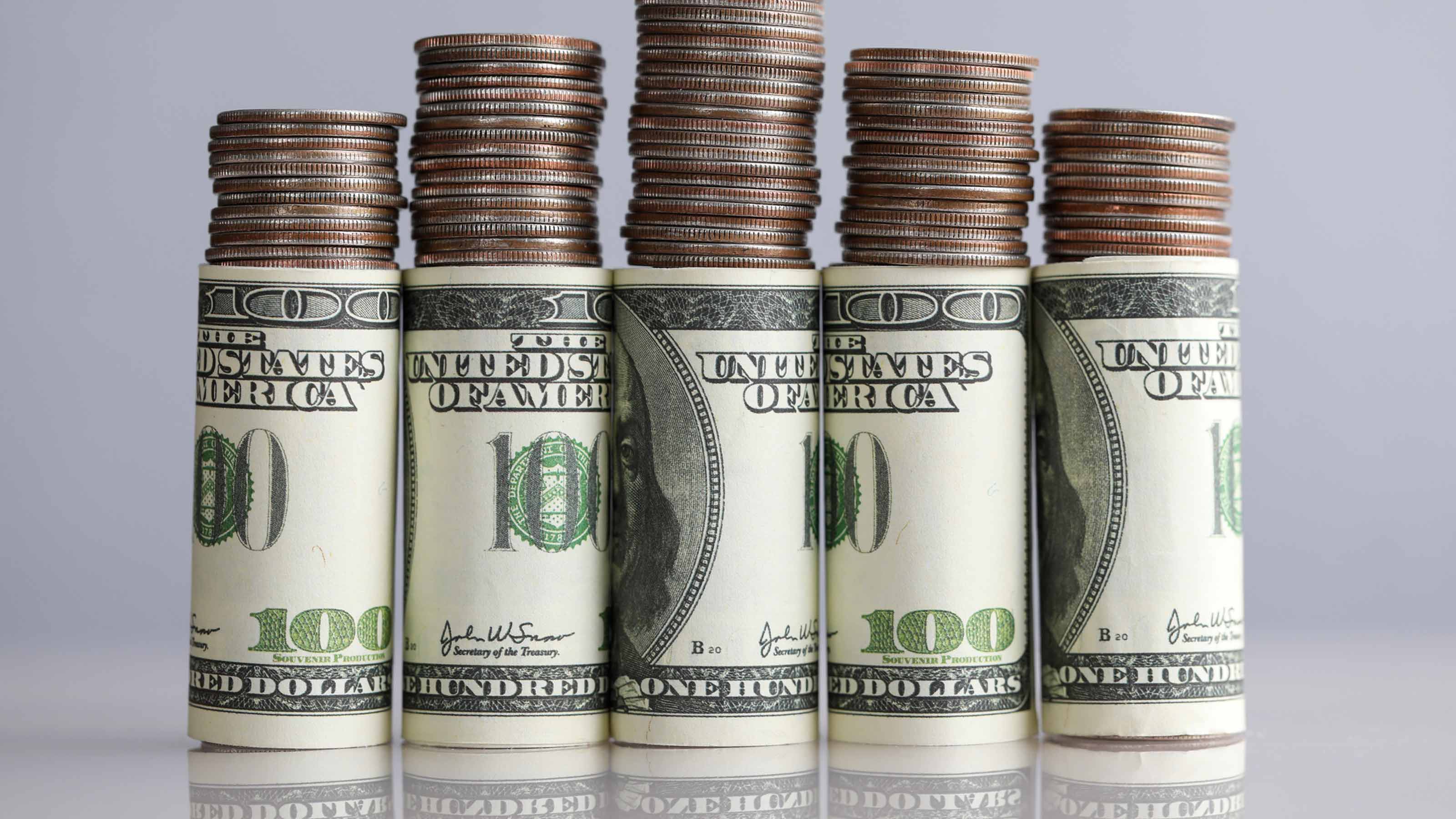Rebuilding Emergency Savings in 2021: Take a Realistic Approach
Saving for a rainy day can be a tall order, especially if you have recently experienced a financial setback. Taking even small steps can help you work toward the larger goal of building up your emergency savings.


Profit and prosper with the best of Kiplinger's advice on investing, taxes, retirement, personal finance and much more. Delivered daily. Enter your email in the box and click Sign Me Up.
You are now subscribed
Your newsletter sign-up was successful
Want to add more newsletters?

Delivered daily
Kiplinger Today
Profit and prosper with the best of Kiplinger's advice on investing, taxes, retirement, personal finance and much more delivered daily. Smart money moves start here.

Sent five days a week
Kiplinger A Step Ahead
Get practical help to make better financial decisions in your everyday life, from spending to savings on top deals.

Delivered daily
Kiplinger Closing Bell
Get today's biggest financial and investing headlines delivered to your inbox every day the U.S. stock market is open.

Sent twice a week
Kiplinger Adviser Intel
Financial pros across the country share best practices and fresh tactics to preserve and grow your wealth.

Delivered weekly
Kiplinger Tax Tips
Trim your federal and state tax bills with practical tax-planning and tax-cutting strategies.

Sent twice a week
Kiplinger Retirement Tips
Your twice-a-week guide to planning and enjoying a financially secure and richly rewarding retirement

Sent bimonthly.
Kiplinger Adviser Angle
Insights for advisers, wealth managers and other financial professionals.

Sent twice a week
Kiplinger Investing Weekly
Your twice-a-week roundup of promising stocks, funds, companies and industries you should consider, ones you should avoid, and why.

Sent weekly for six weeks
Kiplinger Invest for Retirement
Your step-by-step six-part series on how to invest for retirement, from devising a successful strategy to exactly which investments to choose.
You may have heard that you should have three to six months’ worth of essential living expenses saved in case of emergency. It’s sound guidance — but it might be the last thing you want to hear after a year marked by emergencies.
For many of us, 2020 tested our health, safety, bravery and basic financial stability more than any other period in recent memory. If you didn’t already have money saved for emergencies, last year likely wasn’t the time to start stashing it away. And if you did, it may have been a prime opportunity to dip into your reserve.
To that end, a survey from Bankrate found that 35% of Americans have less in their emergency fund now than before the pandemic started, while just 13% have more. Only a quarter have enough saved to cover six months’ worth of expenses, and one-fifth (21%) have no emergency savings at all. Despite these sobering stats, more than half (54%) of respondents said they feel at least somewhat confident in the amount they have socked away. These findings show there’s a disconnect between what people think they need to have saved versus what best practices tell us we need to have saved.
From just $107.88 $24.99 for Kiplinger Personal Finance
Become a smarter, better informed investor. Subscribe from just $107.88 $24.99, plus get up to 4 Special Issues

Sign up for Kiplinger’s Free Newsletters
Profit and prosper with the best of expert advice on investing, taxes, retirement, personal finance and more - straight to your e-mail.
Profit and prosper with the best of expert advice - straight to your e-mail.
To be sure, it can be tough to anticipate how much money we’ll need to cover an emergency, whether it’s unforeseen medical expenses, helping loved ones in need, or replacing income after prolonged unemployment. These scenarios were all too common in 2020 (and continue to be), and many Americans have found themselves coming up short.
But with the benefit of hindsight, many of us may be looking to prepare for the next time we need extra funds. Starting wherever you are today and taking small, practical steps can help you develop sound and effective saving habits. To help you get started, I’ve addressed some of the most common questions about emergency savings below.
How much do I need to have saved?
As noted above, typical guidance suggests you should have three to six months’ of basic living expenses in your emergency fund. Granted, that’s a pretty wide range — so what should you aim for? Everyone’s circumstances are different, but if you have children or ongoing medical expenses, it can be wise to plan for the higher threshold or more.
Not to mention, the events of 2020 showed us that certain industries are particularly hard hit by economic crises — for indeterminate periods of time. If you’re in a job that’s vulnerable to market fluctuations, you may need an even higher target.
For most people, essential living expenses include housing, food, utilities, transportation and health care. Depending on your family, they might also include child care or eldercare costs, or education expenses. If you have debts, they might also include minimum monthly payments to your lenders.
To determine your emergency savings target, take an average of how much you spend on all of your essentials in a given month and multiply it by six (or nine or 12, depending on the number of months you want to prepare for). Don’t just estimate: review your bank and credit card statements to get an accurate picture of your spending. The totals may surprise you. Of course, a loss of income isn’t the only type of financial emergency, so you may want to build in a cushion for home repairs, unforeseen medical events or the sudden need to travel or relocate.
Where do I get the money from?
Meeting your current expenses can be hard enough without the additional pressure of saving for future unknowns. But understand that funding an emergency reserve doesn’t happen overnight; you can set aside smaller amounts over time until you arrive at your target. There are a number of strategies you can apply as you source this money.
First, you can factor saving for this purpose into your monthly budget. This may require pulling back in certain non-essential categories until you’ve met your goal, but remember that these adjustments can be incremental and temporary. For example, with many of us spending more time at home, money previously spent on dining, entertainment, travel and commuting might be steered toward emergency savings instead.
Next, if you’re working, you can dedicate part of your bonus or tax refund to your emergency reserve. While it can be tempting to treat those dollars as “fun money” or use them on short-term expenses, your future self may thank you for allocating some of them to your rainy-day fund.
Another possibility is starting a side business. If your friends are always saying, “You should charge for that!” when commenting on your hobbies and skills, give it some serious consideration. There are many online platforms that could help you earn money for your time and wares.
Lastly, if you have money invested, take a look at your total financial picture to ensure you’ve got an appropriate ratio of liquid cash on hand for emergencies. A financial professional can be a great resource for providing tailored guidance on asset allocation.
You can also mix and match these strategies to make the task of saving more manageable and potentially meet your goal sooner.
Where do I keep it?
Put your rainy-day fund in a liquid account — for example, a high-yield savings account — that can be accessed quickly if an emergency strikes. Importantly, keep this money in its own account, separate from those you use to pay bills and make purchases day to day. This way, you’ll have an easier time preserving it for when you really need it.
What if I need money fast but don’t have enough in my emergency fund?
If you find yourself in the midst of an emergency and haven’t built up sufficient savings, the guidance above may feel like too little, too late. Fortunately, there are short-term sources of funding and relief available, from temporary loan forbearance and debt relief, to lines of credit and new credit cards with zero-interest promotional periods, to employer assistance and unemployment.
The bottom line
Life is unpredictable — but just because you can’t predict the future, it doesn’t mean you can’t plan for the possibility of financial emergencies.
It’s easy to fall into the trap of “status quo bias,” assuming whatever you have stashed away now is sufficient for the future. However, taking a moment to evaluate your current level of savings versus how much you actually need can motivate you to take action and better prepare your finances for future emergencies.
This article has been prepared for informational purposes only. The information in it has been obtained from sources outside of Morgan Stanley. Morgan Stanley makes no guarantees as to the accuracy or completeness of the information from sources outside of Morgan Stanley. It does not provide individually tailored investment advice and has been prepared without regard to the individual financial circumstances and objectives of persons who receive it. The strategies and/or investments discussed in this article may not be appropriate for all investors. Morgan Stanley recommends that investors independently evaluate particular investments and strategies, and encourages investors to seek the advice of a financial adviser. The appropriateness of a particular investment or strategy will depend on an investor’s individual circumstances and objectives.
Asset Allocation does not assure a profit or protect against loss in declining financial markets.
Morgan Stanley Smith Barney LLC (“Morgan Stanley”), its affiliates and Morgan Stanley Financial Advisors or Private Wealth Advisors do not provide tax or legal advice. Individuals should consult their tax adviser for matters involving taxation and tax planning and their attorney for legal matters.
Morgan Stanley is not responsible for the information contained on the third-party websites. Nor do we guarantee their accuracy and completeness.
© 2021 Morgan Stanley Smith Barney LLC. Member SIPC. CRC 3442379 03/21
Profit and prosper with the best of Kiplinger's advice on investing, taxes, retirement, personal finance and much more. Delivered daily. Enter your email in the box and click Sign Me Up.

Krystal Barker Buissereth, CFA®, is a Managing Director and the Head of Financial Wellness for Morgan Stanley at Work. In this role, she is responsible for working with corporate clients and organizations on creating, implementing and managing financial wellness programs that meet the needs of their employees.
-
 Nasdaq Leads a Rocky Risk-On Rally: Stock Market Today
Nasdaq Leads a Rocky Risk-On Rally: Stock Market TodayAnother worrying bout of late-session weakness couldn't take down the main equity indexes on Wednesday.
-
 Quiz: Do You Know How to Avoid the "Medigap Trap?"
Quiz: Do You Know How to Avoid the "Medigap Trap?"Quiz Test your basic knowledge of the "Medigap Trap" in our quick quiz.
-
 5 Top Tax-Efficient Mutual Funds for Smarter Investing
5 Top Tax-Efficient Mutual Funds for Smarter InvestingMutual funds are many things, but "tax-friendly" usually isn't one of them. These are the exceptions.
-
 Social Security Break-Even Math Is Helpful, But Don't Let It Dictate When You'll File
Social Security Break-Even Math Is Helpful, But Don't Let It Dictate When You'll FileYour Social Security break-even age tells you how long you'd need to live for delaying to pay off, but shouldn't be the sole basis for deciding when to claim.
-
 I'm an Opportunity Zone Pro: This Is How to Deliver Roth-Like Tax-Free Growth (Without Contribution Limits)
I'm an Opportunity Zone Pro: This Is How to Deliver Roth-Like Tax-Free Growth (Without Contribution Limits)Investors who combine Roth IRAs, the gold standard of tax-free savings, with qualified opportunity funds could enjoy decades of tax-free growth.
-
 One of the Most Powerful Wealth-Building Moves a Woman Can Make: A Midcareer Pivot
One of the Most Powerful Wealth-Building Moves a Woman Can Make: A Midcareer PivotIf it feels like you can't sustain what you're doing for the next 20 years, it's time for an honest look at what's draining you and what energizes you.
-
 I'm a Wealth Adviser Obsessed With Mahjong: Here Are 8 Ways It Can Teach Us How to Manage Our Money
I'm a Wealth Adviser Obsessed With Mahjong: Here Are 8 Ways It Can Teach Us How to Manage Our MoneyThis increasingly popular Chinese game can teach us not only how to help manage our money but also how important it is to connect with other people.
-
 Looking for a Financial Book That Won't Put Your Young Adult to Sleep? This One Makes 'Cents'
Looking for a Financial Book That Won't Put Your Young Adult to Sleep? This One Makes 'Cents'"Wealth Your Way" by Cosmo DeStefano offers a highly accessible guide for young adults and their parents on building wealth through simple, consistent habits.
-
 Global Uncertainty Has Investors Running Scared: This Is How Advisers Can Reassure Them
Global Uncertainty Has Investors Running Scared: This Is How Advisers Can Reassure ThemHow can advisers reassure clients nervous about their plans in an increasingly complex and rapidly changing world? This conversational framework provides the key.
-
 I'm a Real Estate Investing Pro: This Is How to Use 1031 Exchanges to Scale Up Your Real Estate Empire
I'm a Real Estate Investing Pro: This Is How to Use 1031 Exchanges to Scale Up Your Real Estate EmpireSmall rental properties can be excellent investments, but you can use 1031 exchanges to transition to commercial real estate for bigger wealth-building.
-
 Should You Jump on the Roth Conversion Bandwagon? A Financial Adviser Weighs In
Should You Jump on the Roth Conversion Bandwagon? A Financial Adviser Weighs InRoth conversions are all the rage, but what works well for one household can cause financial strain for another. This is what you should consider before moving ahead.